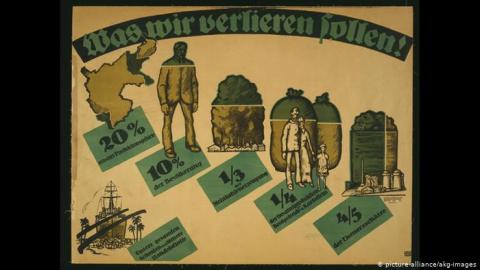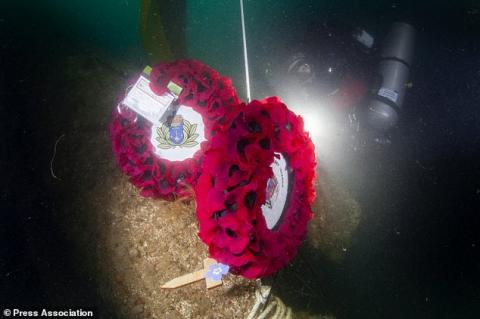Centenaries converge for Versailles Treaty, Weimar Republic, High Seas Fleet scuttling
A German poster from 1919 showing 'what we are supposed to lose.'
By Carolyn Yeager
THE 100th ANNIVERSARY OF THE SIGNING OF THE VERSAILLES PEACE TREATY was quietly commemorated this week in Germany. The date of the signing was June 28, 1919.
The treaty was 100% the creation of the Allied victors. No German negotiators were allowed to participate in discussing its content. Thus the peace treaty was a fait accompli which Germans never agreed to but were compelled to sign. It forced the country to pay billions in reparations; to give up its colonies in Africa, Asia and the Pacific region; and to cede almost 20% of its territory to other nations: Alsace-Lorraine became French and most of West Prussia became Polish. The victorious powers — led by the United States, Britain, France and Italy — declared Germany and its allies to be solely responsible for the outbreak of the war that they themselves had turned into a World War. They accused the Germans of having forced them into war (when it was clearly the other way around), thus holding the Reich accountable for "all losses and damages" incurred.
The Treaty of Versailles was not signed by the Chancellor of Germany, Philipp Scheidemann, because he refused to sign it, resigning his office instead. Germany was forced to sign, however, on the threat that the Allies would invade their country if they didn't! The Rhineland, incidentally, had remained occupied since the armistice of November 11, 1918.
In Germany at the time, many dismissed the treaty as a "dictated peace" due to its very harsh terms. This feeling was undoubtedly justified, and led many more astute observers in Europe to predict the future failure of the “peace.”
The establishment of the new republic followed close upon the signing of the armistice on Nov. 11, 1918.
The Weimar Republic was established even before the Versailles peace treaty came about. Following a communist-Jewish instigated “revolution” that forced the end of the monarchy and persuaded the army to lay down its arms, based on the deceitful promises of the Allies, Germany signed an armistice on Nov. 11, 1918.
From November 1918 to January 1919, Germany was governed by the Soviet-inspired "Council of the People's Deputies," under the leadership of Friedrich Ebert and Hugo Haase. The army was not fully on board with this, so to get their acceptance of the new government, Ebert promised independence from government reforms. The new Reichswehr remained fully under the control of the German officer class.
In February 1919, the position of President of Germany was created. A National Assembly was convened in Weimar and wrote a new constitution which was adopted on 11 August 1919. This constitution is said by today's German authorities to have been both brilliant and “too liberal.” It allowed "too much freedom" of political parties, leading to the rise and success of National Socialism, according to a report in Deutsche Welle. Stephan Harbarth, vice-president of Germany's top court, considers the following as examples of having gone too far:
“Too much power to the President” at the expense of Parliament's ability to stifle him.
“Allowance for suspension of rights under emergency powers” which Hitler used to pass the Enabling Act after the Reichstag fire.
“No threshold for parties to enter Parliament” … that is, small splinter parties could get in.
These three, he said, were exploited by the 'Nazis' during their rise to power … umm, cue sinister music. You might say his complaint is against “too much democracy!” That is actually the fine balance that Europe is looking to achieve today. A Liberal Democracy without too much democracy.
100-years since the scuttling of the German High Seas Fleet at Scapa Flow
Wreaths laid at the bow on the Dresden after the ceremony at Scapa Flow. (Marjo Tynkkynen)
Also in June, German navy divers laid underwater wreaths at the remaining shipwrecks lying in the bay off a Scottish island. Hundreds attended commemorations on Friday in remembrance of those who lost their lives as a result of the incident in Scapa Flow on June 21 1919. The total number of German burials from the time of interment and imprisonment during that period in Scapa Flow is 13.
Historian Nick Jellicoe described the scene at the time it took place as “chaos, absolute pandemonium”.
Mr Jellicoe said: “Eight solders had been shot, some shot by rifle fire, but one has to put this down to the panic – the sheer panic – of the moment.
“They didn’t know how to stop this, maybe it was frustration and anger that added to this, but it was a pretty reprehensible act.
“They were shot under the white flag – that should never happen.”
* * *
Following the end of World War I in November 1918, 74 German ships were interned in Scapa Flow, a shallow, sheltered bay in the Orkney Islands north of Scotland. 'Even months after the Armistice was signed, nine German sailors lost their lives on June 21, 1919, trying to defend the pride of the last vestige of the German Empire: the High Seas Fleet. The story of their scuttling, which inspired plays and films in the 1920s, was dramatic enough:
“Skeleton German crews, disaffected and sick after months on board, had surreptitiously loosened portholes, drilled holes in bulkheads and left watertight doors open, waiting on the order from their commander, Admiral Ludwig von Reuter, aboard the fleet's flagship, the Emden.
“Von Reuter, in turn, was waiting for the outcome of the peace talks in Paris, where the fate of Germany's ships was to be decided. Historians believe that von Reuter had been ordered to sink the ships at all costs (a violation of the Armistice agreement), but only if, as was expected, the Allies decided that they were to be seized. France, in particular, was said to be keen to acquire extra ships.
“The British Navy suspected that the Germans were planning to sink the ships and prepared plans to stop them, but von Reuter found an opportunity in an alignment of circumstances: a delay to the signing of the Treaty of Versailles, which the German admiral was not kept informed of, and a bright day on June 21 that allowed the Royal Navy to leave the bay to go out on exercises.
“After von Reuter sent out a signal by semaphore and searchlights at around 11:20 a.m., sea cocks, flood valves and internal pipes were opened. It took an hour for the news to reach Admiral Sydney Fremantle of the Royal Navy, leading the exercises, and another two for his fleet to return to Scapa Flow, by which time crews were only able to save 22 of the ships.
"'During the scuttling, some of the Germans were shot for refusing to go back to their ships to stop them from sinking,' said Kevin Heath, one of the organizers of the commemoration projects, who has helped survey the salvage sites of the seven shipwrecks still at the bottom of the bay. 'And 21 were wounded, mostly from bayonet wounds and being hit with rifle butts.'
"Admiral Von Reuter was made a prisoner of war but his act of defiance was celebrated in Germany. His grandson, Yorck-Ludwig von Reuter, rang a bell from the German naval association in commenoration of those who lost their lives in the scuttling."
“To the defeated naval officers, the scuttling at Scapa Flow was a kind of belated victory,” said German military historian Michael Epkenhans. "They had failed to beat the British on the high seas, but thus they made sure that the British and their allies wouldn't get the High Seas fleet," he said, speaking from the Orkney Islands. "It was better than nothing, and, when they came home, they felt like victors, and were treated as heroes. And, if you look at the memoirs of some of the admirals, you can see they really rejoiced about [the scuttling]."
An inspiring story, no? I think so. Long live the German nation! God save the Germans!
Category
Germany, World War 1- 864 reads












Comments
More of the suppressed information needed,
Thank you for sharing this!
Even more suppressed is the information about the peace offers Germany made in 1916-17. The more supressed, the more imortant, and the more we will speak about it!
My copy of Nicholas
My copy of Nicholas Kollerstrom's 'How Britain initiated both World Wars' (2017) arrived in the mail just five minutes ago, appropriate don't you think...
I would never have bought this book were it not for your Fatherland-ing and attacks on the Eternal Anglo. My advice is, maintain this focus: your efforts are bearing fruit.